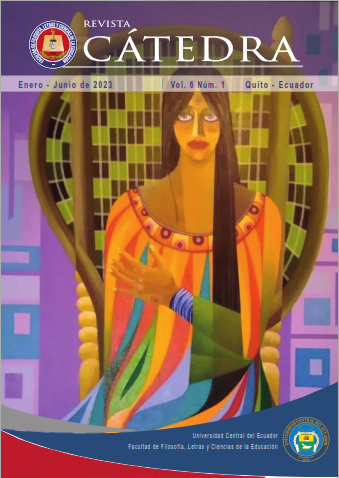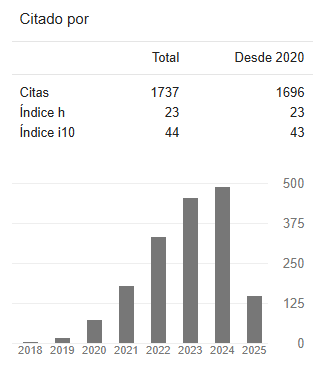Evaluation of the managerial process in the interaction of students with functional diversity in the university environment
DOI:
https://doi.org/10.29166/catedra.v6i1.3879Keywords:
University administration, functional diversity, university environment, inclusion, managerial process, management processAbstract
The purpose of this article was to build a theoretical corpus on the vision of the emerging reality of the managerial process of interaction of students with disabilities in the university environment. For this purpose, the research was based on the interpretative paradigm, qualitative approach, and the epistemological position was based on the conception of knowledge as a social construction, directed by the phenomenological method and supported by hermeneutics with the purpose of interpreting and understanding the meanings created by the social actors from their frames of reference on the phenomenon in an intersubjective environment. An in-depth interview was used as a technique to collect the information, applied to five social actors: two university educational directors; two students with some diversity; and a university professor. The information processing was systematized through codification, categorization and triangulation, where categories associated with the reality of the managerial process of interaction of students with disabilities in the university environment were formulated. A theoretical approach was established from the results unveiled from the voices of the social actors, and categorically in combination with the theory, it was evidenced the imperative need to be trained, both teachers and the student population, to keep in constant learning and update the knowledge bases in relation to the management of students with functional diversity. This led to reflect on the existing collaborative actions that should take place in the educational community, since they are the main actors who, by definition, interact with people with different abilities.
Downloads
References
Ainscow, M. (1999). Desarrollo de escuelas inclusivas. Madrid: Narcea.
Becerra O. 1998. Acontecimientos contemporáneos, clima cultural y retos cognitivos emergentes. Educación y sociedad. UPEL – IPM. Venezuela.
Barbecho, N. y Gómez, C. (2022). La gerencia educativa inclusiva potencia el trabajo docente. Ciencia Latina Revista Científica Multidisciplinar, 6(2), 4355-4377. https://doi.org/10.37811/cl_rcm.v6i2.2167
Benney, M. (1970). La Entrevista es la Herramienta de Excavar Favorita. Bilbao: Mensajero.
Booth, T. (1996). A perspective on Inclusion from England. Cambridge Journal of Education, 26(1), 87-9
Chiavenato, I. (2006). Gestión del talento humano. 3ra. Edición. México: McGraw-Hill.
Cook, T. D y Reichardt, Ch. S. (2009). Métodos cualitativos y cuantitativos en investigación evaluativa. (5 Ed.). Madrid: Morata.
Crosby, P. (1996) Los principios absolutos del liderazgo. México: Prentice Hall Hispanoamérica.
Díaz, L. y Rodríguez, L. (2016). Educación inclusiva y diversidad funcional: Conociendo realidades, transformando paradigmas y aportando elementos para la práctica. Revista del Instituto de Estudios en Educación Universidad del Norte. vº 24 enero-junio, 2016 ISSN 2145-9444 (electrónica) http://dx.doi.org/10.14482/zp.24.8721.
Drucker, P. (2002). La gerencia de la sociedad futura. Bogotá: Norma.
DSMV (2018). Manual de Diagnósticos y Estadísticas de las Enfermedades Mentales. https://psicologia.isipedia.com/optativas/alteraciones-deldesarrollo/diversidad-funcional-intelectual. [Consulta: 2021, noviembre,12].
Echeita, G., y Duk, C. (2008). Inclusión educativa. REICE. Revista Iberoamericana sobre Calidad, Eficacia y Cambio en Educación, 6(2),1-8. [fecha de Consulta 1 de Junio de 2022]. ISSN: . Disponible en: https://www.redalyc.org/articulo.oa?id=55160201
Escudero, J.M. (1992). La planificación en el contexto del desarrollo curricular basado en la escuela. Seminario de Formación en Centros. CEP Sevilla.
Follari R. (1996). El ocaso de la escuela. Argentina: Magisterio del Río de La Plata.
García Hoz, V. (1981). La calidad de la educación. Exigencias científicas y condicionamientos individuales y sociales en la obra colectiva: La calidad de la educación. Madrid. C.S.I.C.
Garbanzo, G. (2016). Desarrollo organizacional y los procesos de cambio en las instituciones educativas, un reto de la gestión de la educación. Revista Educación, 40(1), 67-87.
García J (2003). Movimiento de Vida Independiente. Madrid: Fundación Luis Vives.
Gil, M. (2012). La Formación del Docente en el contexto de la enseñanza de la ciencia: Una Mirada desde el Pensamiento Complejo. Tesis Doctoral. UDO. Cumaná.
Goetz, J.P. y LeCompte, M.D. (2008). Etnografía y diseño cualitativo en investigación educativa. Madrid: Morata.
Martínez, M. (2008). Ciencia y arte en la metodología cualitativa. México: Trillas.
Miner J (1978). El Proceso Administrativo. Teoría, Investigación y Práctica. Caracas: CECSA.
Münch, L. (2006). Fundamentos de Administración. Casos y prácticas. México: Trillas.
Muñoz, A. P. (2010). Discapacidad: contexto, concepto y modelos. Internacional Law, Revista Colombiana de Derecho Internacional. Colombia.
Organización de las Naciones Unidas (1982). Programa de acción mundial para las personas con discapacidad de las Naciones Unidas.
Ortiz, J. (2000). La educación en los nuevos paradigmas. Cali, Colombia: Caleña.
Palacios, A (2007). La discapacidad como una cuestión de derechos humanos: Una aproximación a la Convención Internacional sobre los Derechos de las Personas con Discapacidad. Madrid Cinca.
Peña, N. (2014), La diversidad en la enseñanza universitaria. Un reto por la creación visual desde la invidencia. Universidad de Valladolid. Revista Pedagógica Nro. 23-2014.
Pérez Bueno, L. (2010). Modelo Social de la discapacidad. Madrid: Cinca.
Pérez Gómez, A. (2000). La cultura escolar en la sociedad neoliberal. Madrid: Morata.
Ricoeur, P. (1991). Retórica poética hermenéutica. Estudios de Filosofía, 87- 97.
Robbins, S. y Coulter, M. (2005). Administración. México: Pearson Educación.
Ruiz, J (2002). Gerencia en el Aula. Yaracuy. Venezuela. Fondo Editorial Universidad Pedagógica Experimental el Libertador.
Taylor, S. (1986). Introducción a los Métodos Cualitativos de Investigación. México: Paidos.
UNESCO (1994). Declaración de Salamanca. España









